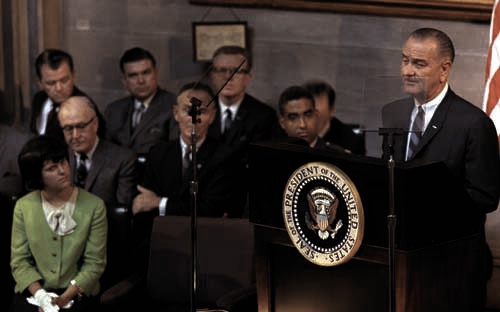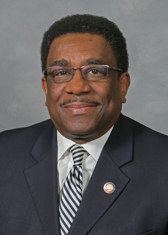RALEIGH — State Rep. Garland Pierce joined state and national leaders on Thursday in celebrating the golden anniversary of the 1965 Voting Rights Act.
Pierce, who represents parts of Scotland, Robeson, Richmond and Hoke counties, lead the commemoration as chairman of the North Carolina Legislative Black Caucus.
“On the 50th anniversary of this extraordinary event in our nation’s history, let us remember all the men and women, and their contributions to making America a more just and fair society,” Pierce said at a press conference with caucus members. .
President Lyndon B. Johnson signed the landmark Voting Rights Act into law on Aug. 6, 1965.
“Millions of Americans are denied the right to vote because of their color,” Johnson said at the time. “This law will ensure them the right to vote. The wrong is one which no American, in his heart, can justify. The right is one which no American, true to our principles, can deny.”
The law bans discriminatory voting practices, allows citizens to challenge discriminatory voting practices, and until a recent U.S. Supreme Court decision, could require certain states or counties to get federal approval before making changes to voting policies.
Before passage, some states had used laws – including literacy tests, grandfather clauses and poll taxes – to prevent blacks from voting.
The Constitution says little about voting, leaving the subject to the states. Until about 1850, the vote was limited to white male property owners. Some of the early colonies banned Catholics and Jews from the polls. The 15th Amendment to the U.S. Constitution granted voting rights to black men in 1870. Women, including black women, won the right in 1920. Decades later, blacks still were fighting official southern resistance.
“The Voting Rights Act has had a transformative impact on the political landscape of our country,” said state Sen. Floyd B. McKissick Jr. of Durham. “It has led to the election of women, minorities and those who were historically disenfranchised and denied the right to vote.”
But Pierce said “there is still work to be done.”
According to the Wagram Democrat, subtle restrictions that have emerged in recent years — ID laws and limits on registration drives — are again putting voting rights in jeopardy.
There is ongoing litigation in North Carolina, as well as in Ohio and Wisconsin. On Wednesday, a federal appeals panel ruled that a strict voter identification law in Texas discriminated against blacks and Hispanics and violated the Voting Rights Act of 1965.
“Voting is fundamental to our democracy,” Pierce said. “In 2013, the Supreme Court struck down a core provision of the 1965 Voting Rights Act, just as numerous states like North Carolina we’re passing restrictive voter identification laws to suppress the turnout of young people, students, poor citizens, the elderly and African-Americans.”


